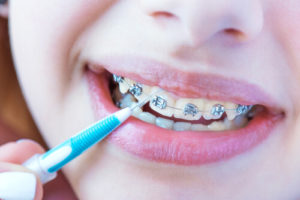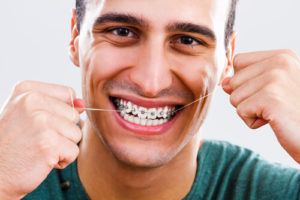Table of Contents
How wonderful it would be if you have straight white teeth! Not only do beautiful straight teeth make you look healthy and your smile radiant, but it can also affect your overall health and keep you away from tooth decay. That is why dentists always recommend their patients to undergo orthodontic or teeth straightening procedures to remedy overcrowded teeth. However, one of the most common complaints and excuses they get from patients who refuse to get braces or aligners is that orthodontic appliances are difficult to maintain. Some even say that they think it will be difficult to brush and clean their teeth if they have metal gears in place. Is this true? Could we experience poor brushing with braces? If so, how can we solve this dilemma?
Poor brushing with braces: The reality
Because kids are always first to complain, it is easy for them to say that braces would hinder them from cleaning their teeth. You can just imagine getting used to brushing your teeth freely, then all of a sudden, obstacles get in the way. At first, when the patient is not used to brush with the braces, we must admit that it may be a bit of a challenge to make sure that all nooks and crevices of the teeth are touched and cleaned by the bristles of your teeth. But once you get the hang of it, brushing your teeth with braces may feel like regular brushing all the same.
Poor brushing with braces: The consequences
If an orthodontic patient continues to practice poor oral hygiene during the treatment, there will be consequences that would turn into complications during the procedure.
Bad breath
 Halitosis is often caused by poor oral hygiene. It may also be a consequence of a medical issue, consumption of odor-producing foods, and vices like smoking. However, if bad breath develops only after getting braces, then it is definitely caused by poor oral hygiene. Bacteria feed on food particles left in your mouth, and this bacteria creates odor. This means that any tiny bits of food that are stuck in brackets or between teeth will contribute to bad breath.
Halitosis is often caused by poor oral hygiene. It may also be a consequence of a medical issue, consumption of odor-producing foods, and vices like smoking. However, if bad breath develops only after getting braces, then it is definitely caused by poor oral hygiene. Bacteria feed on food particles left in your mouth, and this bacteria creates odor. This means that any tiny bits of food that are stuck in brackets or between teeth will contribute to bad breath.
Plaque and tartar buildup
Plaque is a slimy coat of bacteria that feeds on leftover food on the teeth. When this is not removed from the surface of the teeth, it hardens and is now called tartar. This is now the yellowish crust we see on the edges of the teeth that looked like cement deposits.
Tooth decay and Gingivitis
Once the plaque and tartar are unattended, they progress in harming the teeth and gums, causing tooth decay and gum infections. Remember that plaque contains bacteria that damage the enamel, and tartar can settle along the gumline, sometimes just under the gums. So, it is possible that bacteria can also affect the health of your gums.
Teeth sensitivity
If your teeth and gums are now damaged by the bacteria because of poor brushing with braces, symptoms that manifest definitely include teeth sensitivity. Your damaged gums will likely recede and expose the inner portions of the teeth where the nerves and blood vessels are located, making you feel overly sensitive while brushing. Keep in mind that this can also happen if you are too eager and forceful when brushing your teeth. If you exert extra pressure in cleaning your teeth with braces on, it can also cause receding and injured gums.
Poor brushing with braces: How to solve it
 As mentioned earlier, it may be understandable that you will find brushing your teeth with braces initially difficult. It will probably take you much time and effort to make sure that you cleaned every surface of your teeth. But with these simple tips to fight poor brushing with braces, we hope that we can help you maintain the shine and health of your teeth because that is the very reason why you have your braces in the first place.
As mentioned earlier, it may be understandable that you will find brushing your teeth with braces initially difficult. It will probably take you much time and effort to make sure that you cleaned every surface of your teeth. But with these simple tips to fight poor brushing with braces, we hope that we can help you maintain the shine and health of your teeth because that is the very reason why you have your braces in the first place.
Brush twice daily
With or without braces, brushing your teeth daily should become a habit. It does not matter what time you brush in the morning or afternoon, but make sure that you brush your teeth before going to bed. This makes it hard for the bacteria to target and damage your teeth while you are sleeping and your saliva production is low. It also combats the bad morning breath that you may have upon waking up.
Use mouthwash
This may be an accessory and is not as important as brushing, but it works wonders to your breath. Also, swishing the liquid around your mouth can dislodge food debris in between your teeth, helping you ensure the cleanliness of your mouth. We prefer getting a no-alcohol content mouthwash so it would not hurt or sting your mouth when you use it.
Choose the right dental paraphernalia
Soft-bristled brushes bend and easily get in between the spaces of your teeth and braces so they can surely remove dirt and germs that may damage your teeth. You can also get interdental brushes from your dentist or orthodontist so as to help you clean the tiniest nooks at the back of the wires and brackets. Don’t forget to choose a fluoridated toothpaste to help strengthen your enamel and prevent tooth decay. Using floss can also be useful in cleaning underneath the archwires. Let your dental expert show you how to use a floss threader so you can do it on your own next time.
